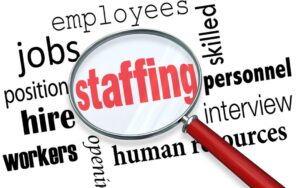It’s no secret that staffing challenges have long plagued the senior living industry, but a new survey shows many operators believe those headwinds have intensified in recent months.
More than three quarters of assisted living providers — 77% — said their overall workforce situation has gotten “much worse” or “somewhat worse” since June, according to a new survey from the American Health Care Association and National Center for Assisted Living (AHCA/NCAL).
The survey results, released Wednesday and based on responses from nearly 1,200 nursing homes and assisted living providers, lend more evidence to the fact that the senior living industry is in the midst of a historic staffing crisis, and one that shows no sign of letting up any time soon.
Only 15% of respondents reported their staffing challenges had “stayed the same,” and just 7% of assisted living providers said staffing challenges had gotten “somewhat better” or “much better” since June, according to the AHCA/NCAL survey.
Slightly more than half of the survey’s respondents (52%) said they are facing “moderate-level staffing shortages,” while another 30% said their staffing shortages were high-level. Another 14% reported low-level staffing shortages, and 4% said they were fully staffed.
These staffing headwinds have led a number of assisted living providers to fear closures of their communities. According to the survey, 42% were “somewhat concerned” that workforce challenges might force them to close down, and another 19% said they were “very concerned” about that outcome. Other providers said they were not concerned at all (28%) about closing due to workforce challenges, and another 11% said they were unsure how they felt.
All of the surveyed assisted living providers reported asking staff to work overtime or extra shifts. Another 38% said they hired temporary agency workers, and 28% said they limited new admissions due to staffing shortages.
Roughly two-thirds of the survey’s assisted living respondents (66%) reported they were having a “very difficult” time hiring new workers, while the remaining respondents (34%) reported they were having a “somewhat difficult” time hiring staff. No respondents said hiring was “somewhat easy” or “very easy.”
In terms of why hiring is difficult, 71% of the survey’s respondents lay the blame on a lack of interested or qualified candidates. Another 72% said unemployment benefits were discouraging workers from getting a job in assisted living — however, recent data shows states that ended unemployment benefits early have so far seen no boost to job growth.
Other reported obstacles to hiring in assisted living included employer- or state-led vaccine mandates (40%), lack of funding to offer a competitive wage (34%) and fear of contracting Covid-19 (9%).
Although staffing challenges were intense for assisted living operators, the survey showed they were even more so for nursing homes. Among skilled nursing operators, 57% reported that their overall workforce situation has gotten “much worse” since June, with 59% reporting high-level staffing shortages.
The survey results show the extent to which assisted living and nursing home operators are struggling with staffing their communities, according to Mark Parkinson, president and CEO of AHCA/NCAL.
“Too many facilities are struggling to hire and retain staff that are needed to serve millions of vulnerable residents,” Parkinson said in a statement.
Since the start of the Covid-19 pandemic, the industry association has sounded the alarm that more resources are needed for senior care companies to hire and retain staff. AHCA/NCAL and fellow industry association LeadingAge have collaborated and laid out proposals for boosting the senior care industry’s workforce as part of the Care For Our Seniors Act.
“Congress has the opportunity right now, through budget reconciliation, to include meaningful investments in long term care, which will help address key staffing challenges,” Parkinson said. “We cannot allow facilities to close because of these challenges, which will directly impact residents and their families.”
Companies featured in this article:
AHCA/NCAL
*CREDIT: Senior Housing News



